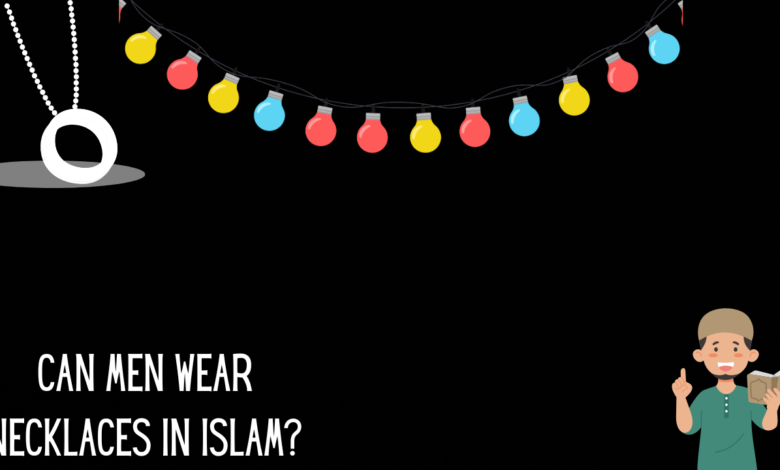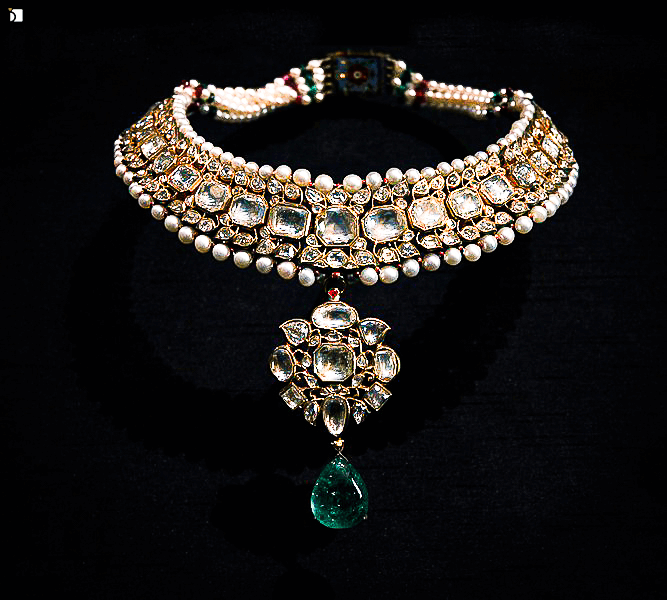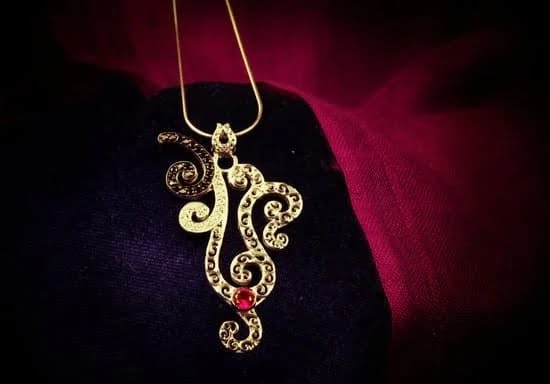The Islamic Perspective On Men Wearing Necklaces: A Comprehensive Exploration
The Islamic Perspective on Men Wearing Necklaces: A Comprehensive Exploration
Related Articles: The Islamic Perspective on Men Wearing Necklaces: A Comprehensive Exploration
Introduction
With enthusiasm, let’s navigate through the intriguing topic related to The Islamic Perspective on Men Wearing Necklaces: A Comprehensive Exploration. Let’s weave interesting information and offer fresh perspectives to the readers.
Table of Content
- 1 Related Articles: The Islamic Perspective on Men Wearing Necklaces: A Comprehensive Exploration
- 2 Introduction
- 3 The Islamic Perspective on Men Wearing Necklaces: A Comprehensive Exploration
- 3.1 Exploring the Islamic Texts: A Search for Guidance
- 3.2 Examining the Different Perspectives: Understanding the Nuances
- 3.3 Engaging with the Topic: Exploring the Benefits and Potential Concerns
- 3.4 Frequently Asked Questions (FAQs): Addressing Common Concerns
- 3.5 Tips for Navigating the Issue: A Practical Approach
- 3.6 Conclusion: A Balanced Perspective on a Complex Issue
- 4 Closure
The Islamic Perspective on Men Wearing Necklaces: A Comprehensive Exploration

The question of whether men can wear necklaces in Islam is a topic that often sparks curiosity and discussion within the Muslim community. While there is no explicit prohibition in the Quran against men wearing necklaces, the issue is often addressed through interpretations of Islamic traditions, cultural practices, and the broader understanding of Islamic principles. This exploration delves into the intricacies of this topic, examining various perspectives and offering insights into the nuanced nature of this question.
Exploring the Islamic Texts: A Search for Guidance
The Quran, the central religious text of Islam, does not explicitly mention the wearing of necklaces by men. However, Islamic scholars often refer to various hadiths (sayings and actions attributed to the Prophet Muhammad) and the broader principles of Islamic jurisprudence (fiqh) to interpret this matter.
Hadith: A Source of Guidance
Some hadiths suggest that the Prophet Muhammad disapproved of men wearing gold jewelry, including necklaces. For instance, a hadith narrated by Abu Dawud states that the Prophet Muhammad said, "Whoever wears gold, it is as if he has poured molten gold on his skin in the Day of Judgment." This hadith is often interpreted to discourage men from wearing gold necklaces, suggesting that it might be considered inappropriate or even prohibited.
The Principle of Modesty:
Beyond specific texts, the Islamic principle of modesty (hijab) plays a significant role in understanding the cultural and religious implications of men wearing necklaces. Modesty in Islam encourages both men and women to dress and behave in a manner that avoids drawing undue attention or provoking desires. While necklaces are not inherently immodest, their design and purpose can influence their interpretation.
Cultural Influences and Societal Norms:
It is important to acknowledge that cultural norms and societal interpretations of Islamic practices can vary significantly. In some Muslim communities, men wearing necklaces is considered acceptable and commonplace, while in others, it may be viewed as inappropriate or even frowned upon.
The Importance of Context and Intention:
Ultimately, the question of whether men can wear necklaces in Islam is not a simple yes or no answer. It is a complex issue that requires careful consideration of various factors, including the type of necklace, the intention behind wearing it, and the cultural context in which it is worn.
Examining the Different Perspectives: Understanding the Nuances
The Islamic world encompasses diverse interpretations and practices regarding the wearing of necklaces by men. Some scholars and communities may adopt a stricter approach, emphasizing the hadith that discourages men from wearing gold jewelry and focusing on the principle of modesty. Others may adopt a more lenient approach, considering the cultural context and recognizing that necklaces can be worn for various purposes, including religious devotion or personal adornment.
The Role of Intention:
Intention is a crucial element in Islamic jurisprudence. If a man wears a necklace with the intention of fulfilling a religious obligation, such as wearing a specific amulet for protection or a rosary for prayer, it may be considered acceptable. However, if the intention is solely for adornment or to attract attention, it may be viewed as inappropriate.
The Type of Necklace:
The type of necklace can also play a role in its interpretation. Necklaces made of materials other than gold, such as silver or other metals, may be considered more acceptable in some communities. Additionally, necklaces with religious significance, such as prayer beads or amulets, may be viewed differently from necklaces that are purely decorative.
The Significance of Context:
The social and cultural context in which a necklace is worn is also an important factor to consider. In some communities, men wearing necklaces is a common practice and may not be seen as inappropriate. However, in other communities, it may be considered unusual or even disrespectful.
Engaging with the Topic: Exploring the Benefits and Potential Concerns
While the question of men wearing necklaces in Islam is often debated, it is crucial to approach the topic with respect and understanding. Examining the potential benefits and concerns associated with this practice can provide further insights into the complexities of this issue.
Potential Benefits:
- Religious Expression: Necklaces, especially those with religious significance, can serve as a tangible reminder of faith and a way to express devotion.
- Cultural Heritage: In some cultures, men wearing necklaces is part of a long-standing tradition that reflects their identity and heritage.
- Personal Adornment: Necklaces can be a form of personal expression and a way for individuals to enhance their appearance.
Potential Concerns:
- Contravention of Islamic Principles: Some scholars argue that wearing necklaces, particularly those made of gold, may contravene the principle of modesty or the hadith that discourages men from wearing gold jewelry.
- Social Stigma: In some communities, men wearing necklaces may face social stigma or disapproval.
- Distraction from Religious Focus: Some individuals may believe that wearing necklaces can be a distraction from their religious focus and may be seen as a form of vanity.
Frequently Asked Questions (FAQs): Addressing Common Concerns
Q: Are there any specific types of necklaces that are considered acceptable for men to wear in Islam?
A: While there is no definitive answer, necklaces with religious significance, such as prayer beads or amulets, are often considered more acceptable than purely decorative necklaces. Necklaces made of materials other than gold, such as silver or other metals, may also be viewed more favorably in some communities.
Q: Is it permissible for men to wear necklaces with gemstones or other adornments?
A: The permissibility of wearing necklaces with gemstones or other adornments depends on the specific context and the intention behind wearing them. Some scholars may consider necklaces with excessive adornment to be inappropriate, while others may view them as acceptable if they are not considered ostentatious or distracting.
Q: What are the implications of wearing a necklace that is perceived as "too flashy" or "immodest"?
A: Wearing a necklace that is perceived as "too flashy" or "immodest" may attract undue attention and could be considered a violation of the Islamic principle of modesty. It is essential to consider the cultural context and the potential impact of one’s attire on others.
Q: How can a man determine whether it is appropriate for him to wear a necklace in his community?
A: It is advisable to consult with a trusted religious scholar or leader in one’s community to understand the local customs and interpretations of Islamic practices regarding men wearing necklaces.
Tips for Navigating the Issue: A Practical Approach
- Consult with a Religious Scholar: Seek guidance from a trusted religious scholar or imam who can provide context-specific advice based on Islamic principles and local customs.
- Consider the Intention: Reflect on the intention behind wearing a necklace. Is it for religious expression, cultural heritage, personal adornment, or other reasons?
- Choose Modest Designs: If you choose to wear a necklace, opt for simple and modest designs that do not attract undue attention or violate Islamic principles.
- Respect Cultural Norms: Be mindful of the cultural norms and expectations within your community regarding men wearing necklaces.
- Focus on Inner Faith: Remember that true faith is not defined by external appearances, but by one’s inner beliefs and actions.
Conclusion: A Balanced Perspective on a Complex Issue
The question of whether men can wear necklaces in Islam is a complex one, with no definitive answer. It is essential to approach this topic with respect, understanding, and a balanced perspective. By considering the relevant Islamic texts, cultural nuances, and individual intentions, Muslims can navigate this issue in a way that aligns with their faith and values. Ultimately, the decision of whether to wear a necklace is a personal one that should be made with careful consideration and a commitment to living a life that is both spiritually fulfilling and culturally sensitive.







Closure
Thus, we hope this article has provided valuable insights into The Islamic Perspective on Men Wearing Necklaces: A Comprehensive Exploration. We appreciate your attention to our article. See you in our next article!
You may also like
Recent Posts
- The Allure Of Cubic Zirconia: A Comprehensive Guide To Its Beauty And Versatility
- The Evolution Of Jewelry Design: Embracing The Power Of CAD
- Corfe Castle: A Journey Through Time In The English Countryside
- Restoring A Precious Symbol: Repairing A Cut Ring
- A Comprehensive Guide To Silver Jewelry In Chennai: Unveiling The City’s Silver Treasures
- A Glimpse Into Kolkata’s Golden Legacy: Exploring City Gold Jewellery
- Navigating The Landscape Of Charitable Giving: Supporting Local Communities In The Wake Of COVID-19
- Corfe Castle And Village: A Journey Through Time
Leave a Reply